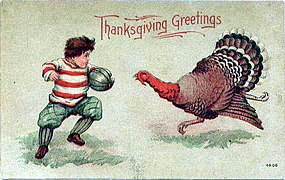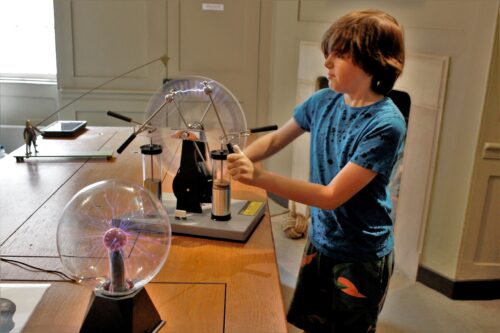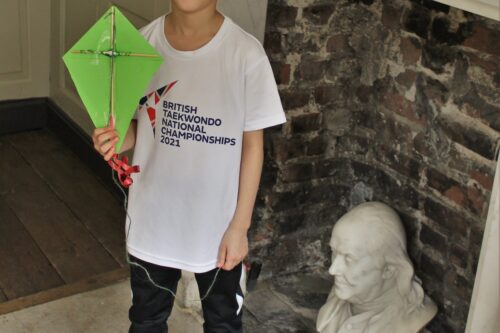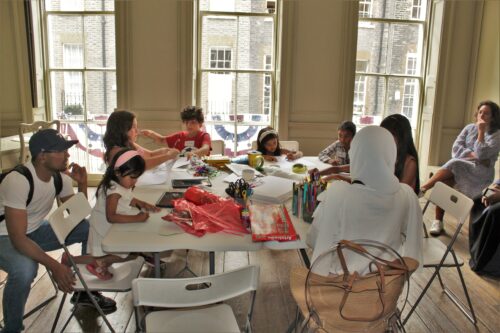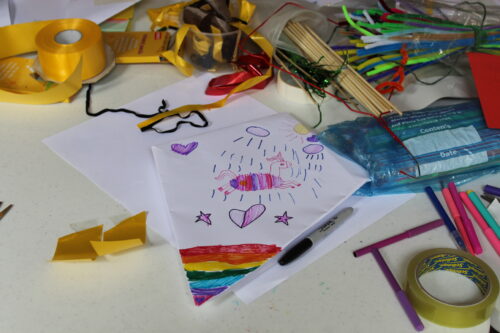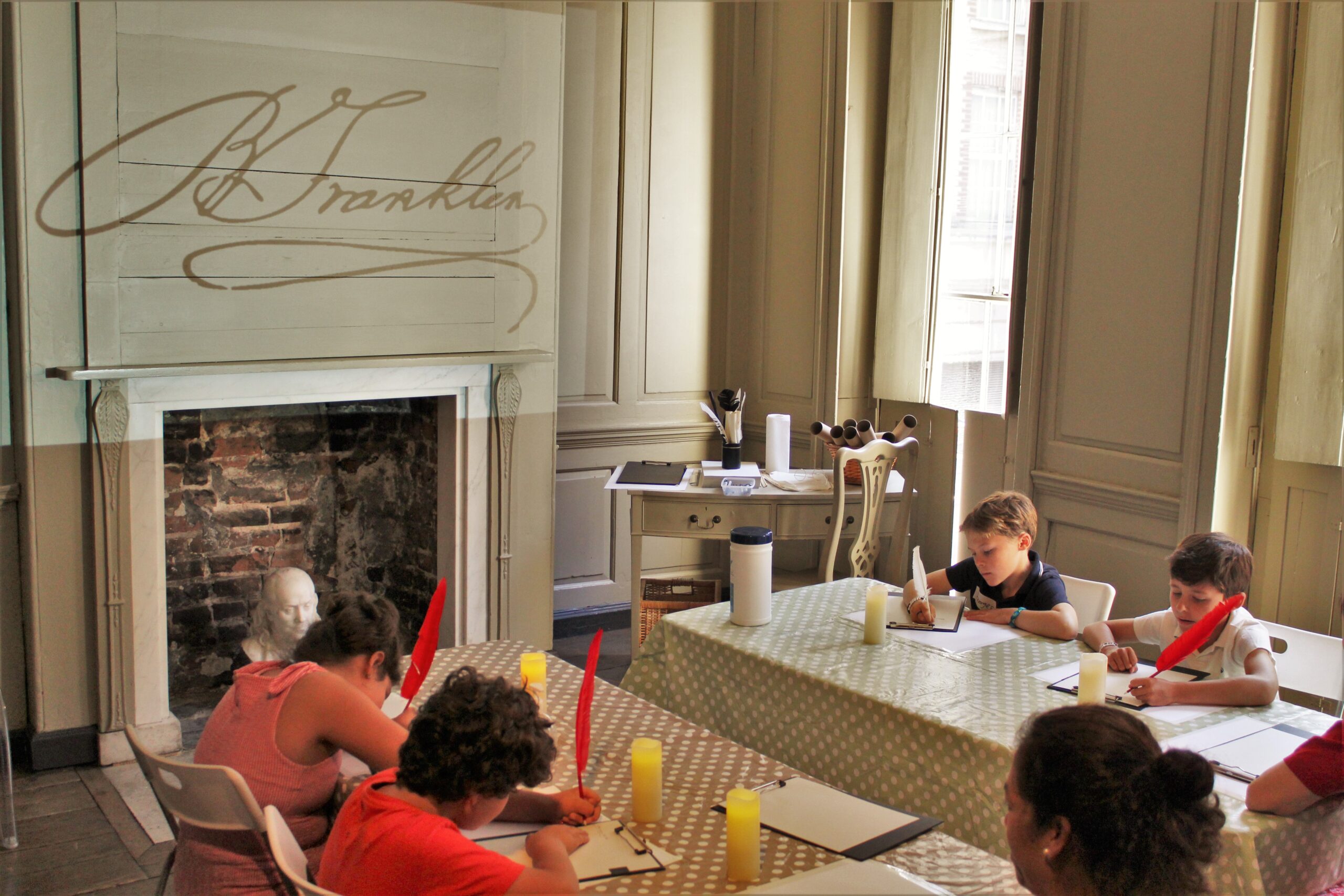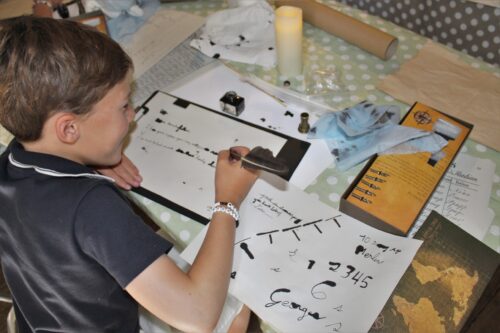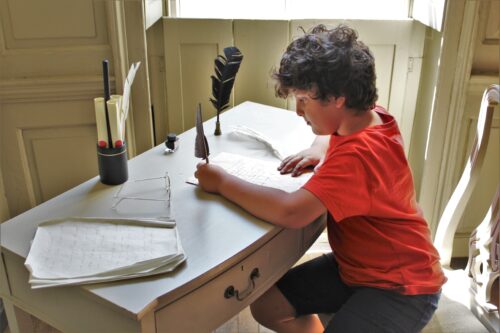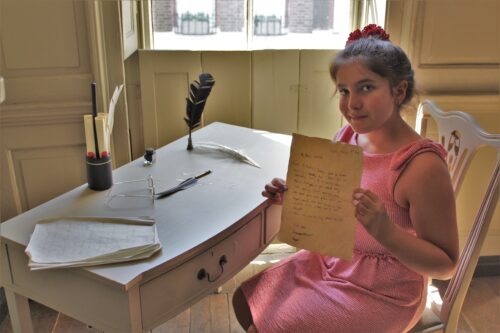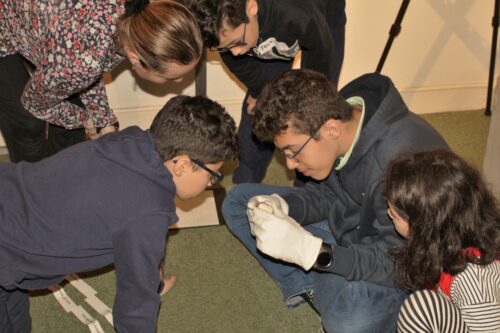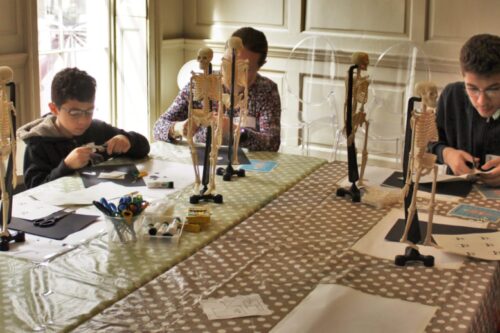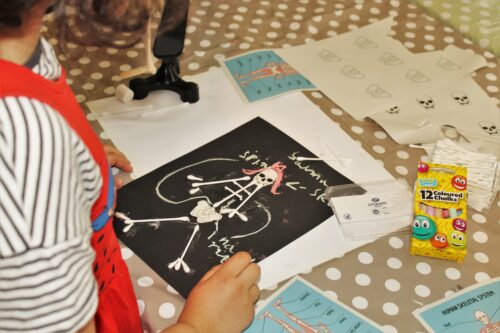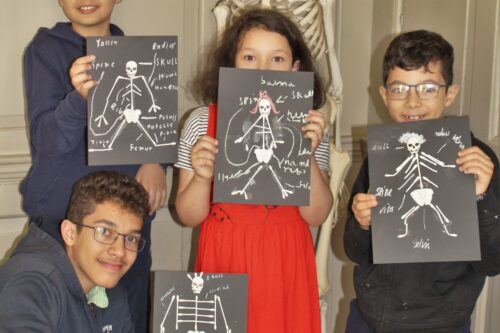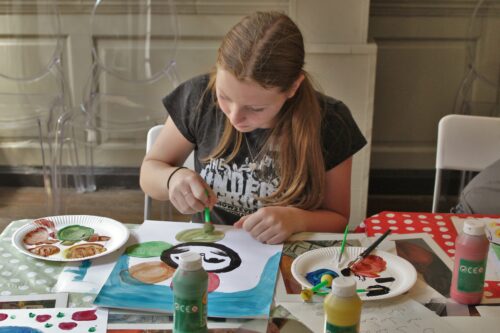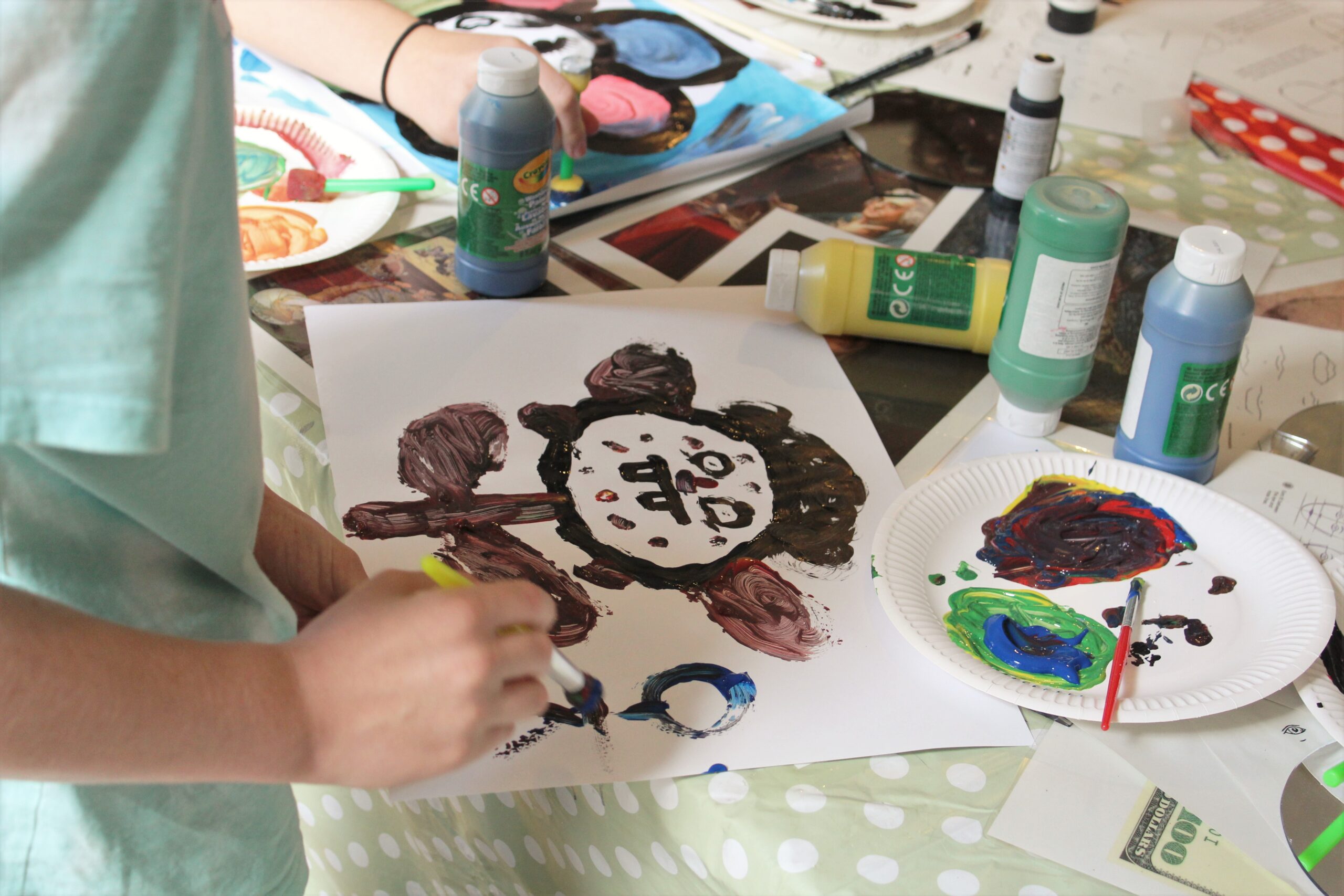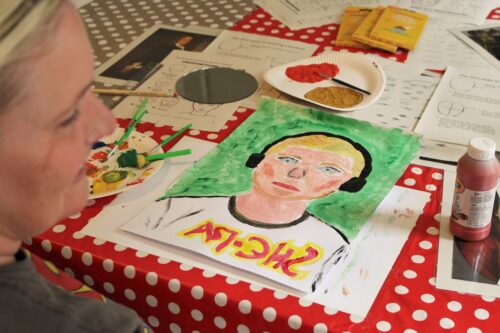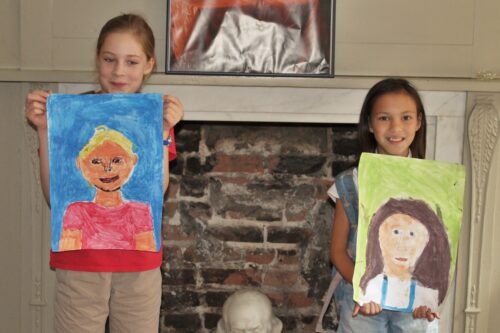Attending MLB London Series 2023? Add Benjamin Franklin House to your to-do list…
St. Louis Cardinals face Chicago Cubs at the London Stadium June 24 to 25. Extend the excitement of your MLB London Series trip with our top tips and 10 reasons to visit Benjamin Franklin House:
-
A new way to learn the story behind the man on the C-Note
With a visit to the Benjamin Franklin House, history comes alive! We offer an immersive experience that tells the rich story of Franklin in London through live interpretation, sound, lighting, and visual projection.
-
Connect with London’s past and present
Entering Craven Street from the hustle and bustle of a 21st century Strand, you are immediately transported to Franklin’s 18th century London. A true hidden gem!
-
Learn
Franklin was a huge advocate of education for all! Benjamin Franklin House offers an accessible and enjoyable way to refresh all you learnt about Ben in High School. Connect with us on social media to learn more about Franklin’s life through short and digestible content.
-
Get answers to the age-old question…was Benjamin Franklin a serial killer?!
Find out why 1200 human bones were discovered buried in our garden…
-
Americana
Looking for a home away from home? Indulge those American roots and find out why Franklin loved this city so much.
-
The heart of London
Located in Westminster in the centre of London, Benjamin Franklin House is perfect for an off-the-beaten-track attraction amongst local tourist hotspots like the London Eye, Big Ben and Buckingham Palace.
-
Original 18th Century architecture
Experience an authentic 18th century London home! Built in 1730, the House retains a lot of its original features that Ben himself would recognise. On Fridays, our Architecture Tours dive deep into its fascinating history.
-
Franklin Trail
The Benjamin Franklin House is one exciting spot along the Franklin Trail in London. Central to the trail, come and learn how he lived, conducted experiments for his scientific inventions and negotiated with key figures of the day.
-
Welcoming and insightful staff
The staff at the Benjamin Franklin House are all Franklin enthusiasts and willing to ask any questions you have!
-
Understanding and appreciation
Learning history helps one reflect on the present day and why certain traditions and
customs exist. Additionally, appreciating history allows one better understand the current
state of affairs and recognise patterns for the future.
Benjamin Franklin: Cub or Cardinal?
Designed to keep Benjamin Franklin’s history alive in the minds of Chicago’s youth, a monument to him stands in the city’s Lincoln Park!
With a big ego and no direct link to the city of St Louis, it’s only fair to assume that Franklin would therefore be rooting for the Cubs.. sorry not sorry.
Top tips to make the most of your MLB London Series!
Transport
The MLB London Series is held at London Stadium, June 24-25. Public transport in London is accessible and easy to use and payment can be made using contactless debit/credit cards and mobile devices.
Downloading the app CityMapper makes directions easy for all IOS and Android users. For more directions, see Transport for London’s tube map, bus map, or guidance on cycling in London.
Visiting Benjamin Franklin House? Here’s some handy advice for getting here!
Hungry?
For ballpark inspired food, MLB London Series has partnered up with some great London establishments!
Representing Chicago Cubs, there’s Yard Sale Pizza.
And for St Louis Cardinals fans, check out Patty & Bun.
More fun on Benjamin Franklin House’s doorstep!
MLB London Series Trafalgar Square Takeover is a three-day celebration of baseball culture in one of the most iconic spots in the city (and a 2 minute walk from us!)
Visit the Fan Festival page to find out more.
A visit to Benjamin Franklin House is a real home run…
The History of Thanksgiving: An Introduction
Alice Hopkinson explores the history of Thanksgiving and challenges us to rethink the accepted narrative.
Last year marked the 400th anniversary of the ‘First Thanksgiving’ of 1621, something that holds a deep, traditional meaning, and has become enshrined in the American cultural conscience. Since George Washington’s first Thanksgiving Proclamation of 1789, Presidents have used the holiday to convey ideals that lie outside the sphere of traditional religiosity and notions of simply ‘giving thanks’ for a bountiful harvest. Proceeding years saw successive Presidents devote their attention towards reaffirming the values of the Founding American Republic, discussing events of the previous year or addressing broader issues affecting the Nation. Whilst this is certainly indicative of a progressing American cultural identity, it is emblematic of Thanksgiving finding its own origin for tradition and subsequently evolving into something far greater and disparate from what it meant at its conception.
Thanksgiving has developed from a solemn and simple Colonial observance of thanks into an enterprising celebration that encompasses a variety of values, yet holds a far more sinister meaning for the Native American people supposedly crucial to its founding legend.
The ‘First Thanksgiving’ at Plymouth
Those who first settled in the Massachusetts Bay area were those who retreated from England following indignation and persecution for their religious practices. As a somewhat more extreme derivative group of Puritans, the Pilgrims sought to deviate from the practise of religion that had been reformed under King James I, and were therefore at severe risk of persecution if they were to remain in England. Fleeing to the New World in search of religious freedom, the Pilgrims landed at Plymouth Rock and on Native Wampanoag territory- something that is frequently omitted from contemporary retellings.
Famine and disease had been rampant throughout the voyage, with these poor conditions only becoming worse as the Pilgrims struggled to provide for themselves and build a self-sustaining settlement in this new environment. After a particularly tough winter the Pilgrims received invaluable guidance and assistance from the Wampanoag tribe, who graciously taught the settlers how to live off the land. It is at this instance that the ‘myth’ around the story of the first Thanksgiving becomes increasingly prevalent. The Pilgrims in return thanked the Wampanoag people and, with the first harvest produced, held a dinner to acknowledge their kindness, enshrining in tradition the act of holding a celebration of thanks for instances of recognising gratitude.

Is this the whole story?
In reality, the peace between the settlers and Native Americans was short lived. Relations between the two groups quickly deteriorated and tensions became more aggravated, particularly with the rapid expansion of European settlements and the vast influx of migration that occurred from the 1630s. As a result, Native Americans were forced out of land that had once been theirs and have since been subject to rampant cultural erasure. This highlights the stark contrast between the seemingly peaceful relationship between the Pilgrims and Native Americans seen in portrayals of the ‘First Thanksgiving’, and the more sinister reality.
The origin of tradition
Despite the 1621 Thanksgiving being famously recognised as the ‘first’, it is important to acknowledge that the tradition of giving thanks was a precedent that long predated the 1620 Mayflower voyage, and something that was essentially imported by the European settlers. Colonists observed thanksgivings regularly and even sustained this practice through the Revolutionary era, observing the celebrations for bountiful harvests, victory in battle or for acts of seemingly divine benevolence that had transpired.
Thanksgiving as a holiday
With George Washington’s 1789 Thanksgiving Proclamation offering gratitude for the recent ratification of the Constitution, formation of the American Republic and preservation of “safety and happiness… for the civil and religious liberty with which we are blessed”, it became possible to acknowledge the shift in meaning of Thanksgiving as a designated holiday held in the public conscience. Whilst Washington does acknowledge the religious sentiments of the occasion and gives thanks for fortune in harvest, he uses similar language to that found in the Declaration of Independence and Constitution, and spends the majority of his Proclamation affirming the founding values of the Republic- going to great lengths to ensure the people maintain the values enshrined in the nation’s founding documents.
Presidents since Washington have used Thanksgiving as a means to address the nation in a manner that is somewhat more informal than through official Proclamations or speeches. In each Proclamation, traditional religious values are consistently affirmed, as is the notion of giving thanks to God for the fortunes of the nation. However, each address is unique to the President and is in many ways a way in which to trace the narrative of American history in accordance with the fundamental issues concerning the nation. Last year President Biden marked the 400th anniversary of the ‘First Thanksgiving’ by acknowledging the “generosity and support of the Wampanoag” and compared their actions to those who have dedicated their time to fighting the COVID-19 pandemic. A very topical Proclamation, it is one that dedicates itself more to reaffirming familial and traditional values as opposed to those of the nation and Founding Fathers- fitting, considering the context in which it was written.
Contemporary meaning
Culturally, Thanksgiving has shed much of its religious sentiment in recent years and has become almost unrecognisable from its origin. Maintaining its association to harvests, it has become more familial, with it being tradition for many families to hold a Thanksgiving dinner that incorporates much of the food typically found on the North American continent, the turkey being the most pertinent example of such.
Furthermore, it has evolved to accommodate America as a consumerist nation that thrives on business and a booming economy, with contemporary traditions such as the Macy’s Day Parade, American football games and the amusing White House turkey pardon being the focus of attention throughout the country.
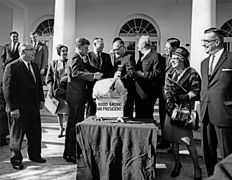

These new and emerging customs demonstrate how Thanksgiving as a cultural tradition has taken on a new meaning that has adapted and evolved in line with the changing American people. Yet aside from the jubilations brought on by the holiday, it is paramount to bear in mind that these traditions exist only for some. Many Native Americans choose not to celebrate Thanksgiving, serving as a reminder that a whole representative body has been practically omitted from the mainstream teaching of Thanksgiving. This highlights the importance of preserving these narratives.
To hear a continuation of this discussion, join us on November 25 2022, 5pm GMT/12pm BST.
Author: Alice Hopkinson
House Highlights: Summer Break @ Ben’s House
Here are some of the highlights from our incredible summer season of family events at Benjamin Franklin House!
Over the month of August we held a number of events as part of our Summer Break @ Ben’s House programme. We learned all about Benjamin Franklin, 36 Craven Street and Georgian Britain as well as getting creative with lots of arts and crafts activities.
In our first week we recreated Franklin’s famous Key and Kite experiment using a Tesla Coil in our Student Science Centre. We each got an opportunity to create a bolt of electricity using our Windhurst Machine before heading down to Franklin’s Parlour to build some decorative kites!
Our second week focussed on the art of calligraphy and the importance of letters in 18th century communication. We deciphered one of Franklin’s own letters before writing our own using dip pens and ink. The workshop was certainly the messiest of them all with inky fingers all round! We also created our own parchment paper with some good old fashioned tea-staining.
The focus of our third week moved away from Franklin and on to one of our other famous residents, the anatomist William Hewson, who lived in the House from 1770-1774. We learned about the anatomy school once located in the House and examined our collection of bones that were unearthed in our basement. We then became archaeologists for the day and explored our collection of archaeology tools and artefacts. To end the session we built model skeletons before creating our own skeleton diagrams using cotton wool buds and glue!
The final week of Summer Break @ Ben’s House explored the history of portraiture and saw us learn some valuable skills in art history. We deciphered the symbols in several famous portraits from history before examining a collection of Franklin portraits to learn more about the man behind the canvass. We then got our paint pallets out to create portraits of ourselves to take home and frame for all to see!
Benjamin Franklin House and the latest documentary from the renowned filmmaker, Ken Burns
On April 4th and 5th 2022, the latest two-part documentary series from the world-renowned Ken Burns debuts on PBS in the US. His award-winning biopics have been broadcast across the world and have focused on an array of influential Americans such as Muhammad Ali, Ernest Hemmingway and Thomas Jefferson. His latest subject is none other than ‘the First American’ himself, Benjamin Franklin. Across four hours, Burns’ documentary explores the extraordinary life of Dr Franklin and features two of Hollywood’s most recognisable stars, Michael Douglas and Mandy Patinkin, in the starring role.
Benjamin Franklin House is proud to feature in an exclusive behind-the-scenes video detailing the Founding Father’s time in London and at 36 Craven Street.
If you would like to find out more about the documentary and watch the exclusive piece about Benjamin Franklin House, visit Ken Burns: Benjamin Franklin website here.
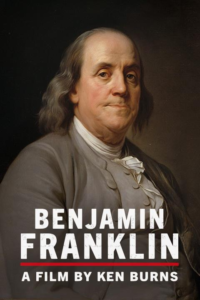
Mary Robinson receives Benjamin Franklin House Medal for Leadership
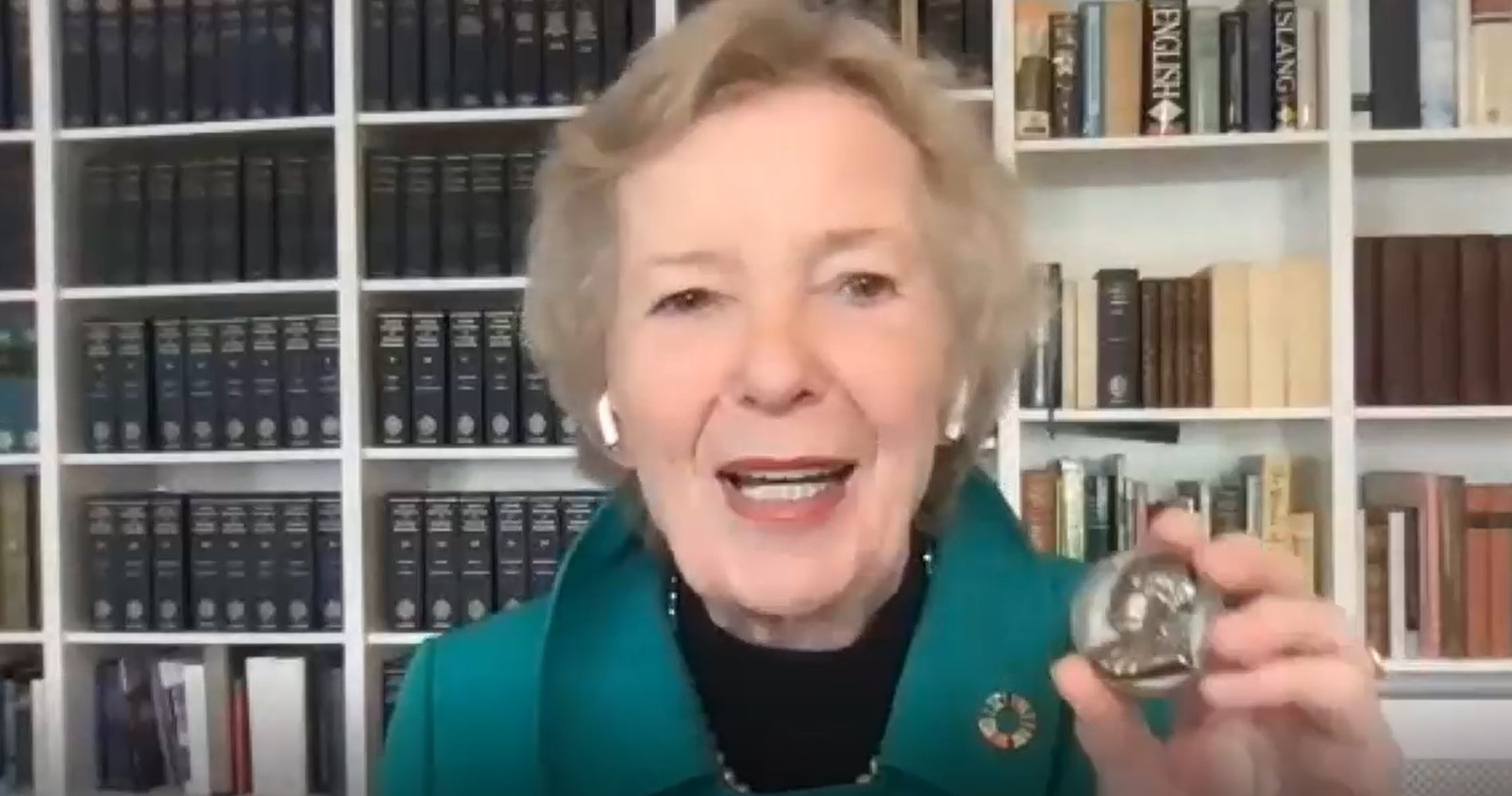
Former President of Ireland, stateswoman and campaigner Mary Robinson has received the Benjamin Franklin House Medal for Leadership in a virtual ceremony on Wednesday 7 July. The award recognises extraordinary individuals following in Franklin’s footsteps who exemplify a commitment to justice, cross-cultural understanding, tolerance and humanity.
Robinson was the first woman President of Ireland from 1990 to 1997 and UN High Commissioner for Human Rights from 1997 to 2002. Her many roles now include Adjunct Professor for Climate Justice in Trinity College Dublin and Chair of The Elders.
Robinson received the award in recognition of her many achievements, over several decades, particularly on gender equality, human rights and climate change.
Watch the full ceremony below:
Previously the Award has been given to:
- Michael Bloomberg, former Mayor of New York and Founder of Bloomberg LP (2014).
- John Kerry, then Special Envoy on Climate Ambition and Solutions (2016).
Benjamin Franklin and the Glass Armonica
Everyone knows the eerie, tinkling notes of the ‘Aquarium’ movement in Camille Saint-Saëns’ symphony for children, The Carnival of the Animals, even if we can’t name the music. But few people realise that the instrument which creates that other-worldly sound – also used in some renditions of the Harry Potter film music – was invented by Benjamin Franklin while living in London in 1761. And fewer still are aware of the role that Franklin’s instrument played in the strange story of hypnotism.
Franklin was inspired to create his glass armonica after hearing an English friend, Edward Delaval, playing a tune on wine glasses filled with water. Delaval was using the tried and tested technique, familiar to anyone who’s run out of things to say in the pub, of running a wet finger around the rim of a wine or beer glass to produce high-pitched ‘singing’. Franklin was convinced he could do better. With his typical ingenuity and attention to detail, he drew up an elaborate design and commissioned a London glassblower, Charles James, to create the first glass armonica.
Franklin’s armonica, also known as a glass harmonica, was made from 37 glass bowls of varying thicknesses and sizes threaded horizontally on an iron spindle which could be turned by a foot pedal. By moistening their fingers with water, a player could produce up to ten notes or chords at a time. The bowls were colour-coded for different notes. Franklin was delighted with the results. ‘Of all my inventions,’ he later said, ‘the glass armonica has given me the greatest personal satisfaction.’ Franklin’s instrument enjoyed its world premiere in 1762 and became hugely popular throughout Europe, inspiring compositions by celebrated musicians including Mozart.
Mozart first encountered the glass armonica in 1773 on a visit with his father to the house of a family friend, the physician Franz Anton Mesmer, in Vienna. After hearing the doctor play the instrument ‘unusually well’, the 16-year-old took a turn at tinkling the glasses himself. Mozart later wrote compositions, including his mournful Adagio for Glass Harmonica, for the instrument.
But it was Mozart’s host, Mesmer, who made the fullest use of the armonica’s ethereal qualities. Mesmer had studied medicine at the University of Vienna before settling in the city as a physician. Becoming disillusioned with orthodox medical therapies, such as bloodletting and blistering, Mesmer was eager to find alternatives. So when a fellow academic, the fabulously named Father Maximilian Hell, said he had cured his heartburn by applying magnets to his body, Mesmer was intrigued. He tried the method on his patients and was convinced he had discovered an invisible force which could be manipulated by magnets. He named this force ‘animal magnetism’. Abandoning magnets, Mesmer found that by using repetitive hand motions and strong vocal suggestions he could induce a kind of sleep in his patients. In this state, patients would slavishly follow his commands, lose their inhibitions and become insensitive to pain.
What Mesmer had stumbled upon, of course, was hypnotism. Although similar techniques had been used since ancient times to induce sleep-like states, Mesmer was the first to harness such methods systematically for medical purposes. Mesmer elevated his technique, which became known as ‘mesmerism, into an art form.
Settling in Paris in 1778, Mesmer became an overnight phenomenon. People flocked to his mesmerism salons where they would sit in a darkened room walled with mirrors as Mesmer, dressed in a flowing lilac robe, waved his hands to the accompaniment of the unearthly strains of his armonica. To treat more people at once, he had a tub or ‘baquet’ filled with water and iron filings. His patients, many of them wealthy ladies of leisure, sat around the tub and grasped one of the protruding iron rods. Handsome male assistants sat behind the patients and clasped them between their knees while applying ‘gentle pressure upon the breasts of the ladies’. According to one observer, ‘the cheeks of the ladies began to glow, their imaginations to become inflamed; and off they went, one after the other, in convulsive fits’.
Feted by Parisian society, including Marie Antoinette – herself a proficient armonica player – Mesmer amassed a fortune which was further increased as he sold his secret to eager disciples. But it was not long before his erotic exhibitions attracted the scorn of the French medical establishment who persuaded Louis XVI in 1784 to set up a royal commission to investigate mesmerism. The inquiry team comprised some of the most eminent scientific thinkers of the era, including Franklin, now aged 78, who was living in exile in France.
Meeting at Franklin’s house, the commission concluded that Mesmer’s invisible force did not exist and any benefit from his methods was due to ‘imagination’. Franklin’s musical invention had helped Mesmer create the highly-charged atmosphere at his mesmerism salons but Franklin’s intervention now helped to end Mesmer’s career. With his methods discredited, Mesmer left town, taking his armonica with him, and spent the rest of his life wandering Europe until he died in obscurity in 1815.
Mesmerism, however, flourished. It was introduced to Britain, by a second-generation disciple of Mesmer, in 1837 and was renamed hypnotism, by the Scottish physician James Braid, in 1841. After various resurgences, hypnotism remains popular today. Franklin’s armonica went on to inspire musical works by Beethoven, Donizetti and Richard Strauss as well as Saint-Saëns. In the early 19th century, however, the armonica fell from favour, partly fuelled by fears that its ghostly music could cause hallucinations and even madness.
Today a rare original armonica survives in the Franklin Institute in Philadelphia and a modern replica can be seen – and heard – at Benjamin Franklin House during Architectural Tours and group visits. And the mystical strains of the armonica are still occasionally produced in music by Bjork, David Gilmore and others.
This article is contributed by Wendy Moore – author, journalist, and one of our distinguished Literary Prize judges. Her most recent book Endell Street (UK)/No Man’s Land (US) is available to purchase online.
NEVER MISS THE LATEST NEWS
Stay Connected
Follow us to get the latest information on upcoming events, specials offers and more.

